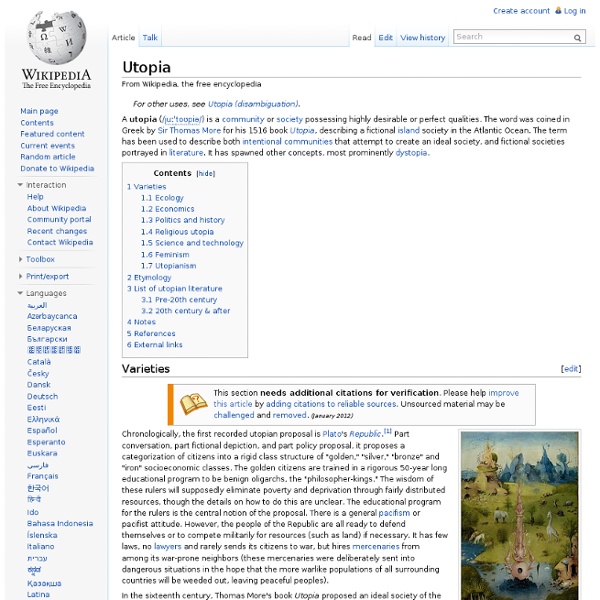Design Your Own Utopia
Introduction Why would anyone want to design a utopia? There are several reasons. The most important is that utopian thought is essential to social change. While the idea of overhauling society as a whole can be daunting, utopian thought does not have to be applied on a global scale to be of value. Given this, the importance of utopian thought in the present situation seems obvious. Simply considering the questions presented in this pamphlet can help us to understand that the present social, political, and economic systems are human inventions, and that we, collectively, have the power to change them. NOTES: This questionnaire was designed to be of use to both those interested in small, intentional communities and those interested in broad, global transformation. To avoid fatigue, we suggest that you only answer the questions in one or two sections at a time. Design Your Own Utopia I. II. III. IV. V. VI. VII. VIII. IX. X. XI. XII. XIII. XIV. XV. XVI. XVII. XVIII. A Small-Scale Utopia
The Giver: Utopia Project - School District of Waupaca - Mary Ann Snider
The Giver , by Lois Lowry Utopia ProjectIntroduction: Utopia was an imaginary island described by Sir Thomas More in the 14th century which was to be a perfect community. Utopia’s government and social customs were all designed to ensure the fulfillment and happiness of its people. Over the years many groups have tried to create utopian communities. Some examples from American history include the Oneida Community, the Shakers, the Harmonists, and Brook Farm. Some modern American utopian communities include Victory City, Utopian States, and The Principality of New Utopia. Other links to browse: Utopia: Wikipedia Dystopia New Harmony . The Principality of New Utopia The Task: Our country is in decline and will soon face extinction. The Process and Resources: Each group member will be responsible to do the following independent tasks for one of the subtopics: 1. Subtopic outlines, note cards, and summary paragraphs will comprise 50% of each student’s grade for this project. 1. 2. 3. 4. 1.
Animal Farm: Allegory and the Art of Persuasion
Activity 1. Animal Farm and Allegory George Orwell’s 1945 novella, Animal Farm, is the story of an animal revolution. How is this story allegorical? Activity 2. Many of the events at Manor Farm are closely linked to political events in Russia during the first half of the twentieth century. Ask students to answer the following questions about the events that take place on the Manor Farm, and how they are an allegorical retelling of the events from the Russian Revolution to the end of World War II in Russia. How is Orwell’s Animal Farm an allegorical retelling of the end of feudalism and the rise and consolidation of communism in Russia? Activity 3. Many of the characters in Animal Farm are clearly meant to represent historical figures. After discussing with the class the trajectory of the Russian revolution and subsequent Communist Party fracturing, ask students to work in pairs to fill in the following PDF chart on the characters of Animal Farm. Activity 4.
Tales of Utopia «
In the beginning part of the year, I started collaborating with Jeff in Montana on a Gifted and Talented project, where middle school students undertook a unit on Utopia. The study book was Animal Farm. We developed a series of activities to meet the standards, which ultimately had the goal of engaging students in creating their own original short stories that used themes taken from the book and other texts. The project culminated in his students publishing their book online. I was trapped. Now the book is published, and what would be even more amazing for them, would be to see people actually buy it – outside of their class and parents. You can preview the entire book online; and have a browse though their work. Watching the clock definitely didn’t make school go by any faster, if anything it just dragged it out. So consider buying it – or at least reading a few stories and leaving them a comment. It costs under AU$40.00 (less with the discount of $10!) Like this: Like Loading...
Education - Challenge Based Learning
Project Based Learning
Introducing an irresistible project at the beginning of a unit of study can give students a clear and meaningful reason for learning. Plus, they end up with a product or result that could possibility make a difference in the world! In project based learning students are driven to learn content and skills for an authentic purpose. PBL involves students in explaining their answers to real-life questions, problems, or challenges. Technology can be helpful throughout a project, whether students use iPads, Chromebooks, Android tablets, laptops, or desktops.



